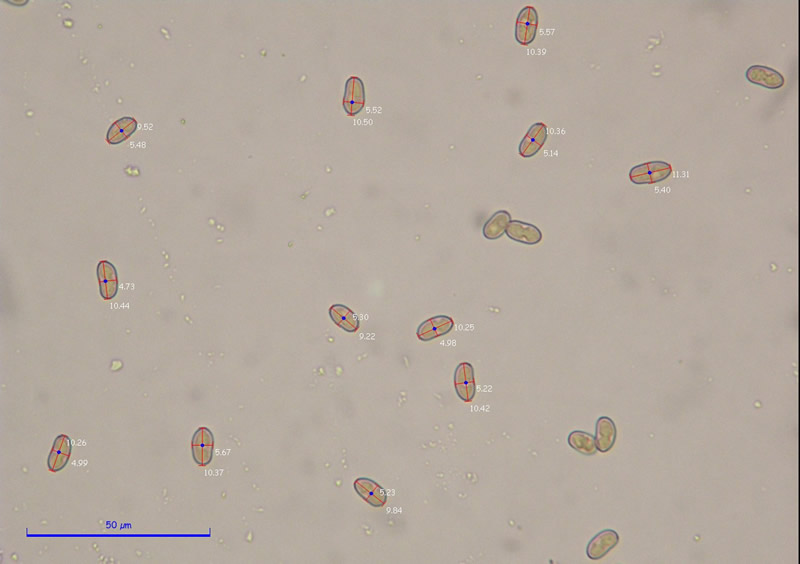Home › Forums › PUBLIC DISCUSSION BOARD › Springtime Inocybe/Havannah Three Hills
- This topic has 2 replies, 2 voices, and was last updated 10 years, 3 months ago by John R.
-
AuthorPosts
-
-
April 27, 2014 at 2:59 pm #807John RKeymaster
Habitat: soil in deciduous woodland; willow, hazel and birch
Cap: up to 6cm. Light/medium brown when wet to golden brown when dry. Slightly radially fibrilose, splitting when older. Sparse remnants of white cortina when young.
Stem: up to 6 cm x 0.8 cm with slightly clavate to bulbous base. Not pruinose.
Gills: cream to pale tan/olivaceous, adnexed. Gill edge white, rough. GEC cylindrical to flask-shaped, thin-walled, non-metuloid.
Spores ellipsoid to bean-shaped, smooth. Me = 10.2 x 5.3 µm ; Qe = 1.9
SP: light brownSmell: indistinct
I get it as far as Rimosae using the Moser Agaric key (which is a quite old). Any suggestions appreciated.


- This topic was modified 10 years, 3 months ago by John R.
- This topic was modified 10 years, 3 months ago by John R.
- This topic was modified 10 years, 3 months ago by John R.
- This topic was modified 10 years, 3 months ago by John R.
- This topic was modified 10 years, 3 months ago by John R.
- This topic was modified 10 years, 3 months ago by John R.
- This topic was modified 10 years, 3 months ago by John R.
- This topic was modified 10 years, 3 months ago by John R.
- This topic was modified 10 years, 3 months ago by John R.
- This topic was modified 10 years, 3 months ago by John R.
- This topic was modified 10 years, 3 months ago by John R.
- This topic was modified 10 years, 3 months ago by John R.
- This topic was modified 10 years, 3 months ago by John R.
-
April 28, 2014 at 10:35 am #826DougParticipant
John I think Inocybe maculata. It is one of the commonest in our area and although maybe slightly pale everything else fits nicely!
Doug. -
April 28, 2014 at 6:38 pm #827John RKeymaster
Thanks for the suggestion Doug. There are a few reasons I thought it might not be maculata (although it may well be).
The light cap colour and lack of fibrous white scales at the centre
No reddening on the stem nor white wooly stem apex
GEC are not club-shaped but cylindrical to flask-shapedIt keyed out in my very old key to I.fastigiata (and Dominique suggested I. rimosa which is the modern name). However it doesn’t really fit with rimosa either as
It has a slight bulb on some specimens
the cap is not as strongly radially fibrillose as expected
it is more a more golden yellow than reportedThere is a suggestion that rimosa is a variable group, but then maybe maculata is too…?
-
-
AuthorPosts
- You must be logged in to reply to this topic.